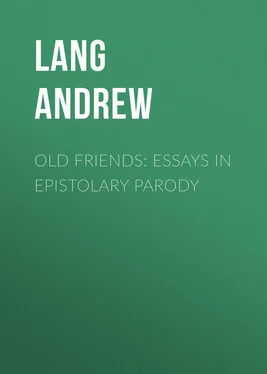Andrew Lang - Old Friends - Essays in Epistolary Parody
Здесь есть возможность читать онлайн «Andrew Lang - Old Friends - Essays in Epistolary Parody» — ознакомительный отрывок электронной книги совершенно бесплатно, а после прочтения отрывка купить полную версию. В некоторых случаях можно слушать аудио, скачать через торрент в формате fb2 и присутствует краткое содержание. Жанр: foreign_antique, foreign_prose, на английском языке. Описание произведения, (предисловие) а так же отзывы посетителей доступны на портале библиотеки ЛибКат.
- Название:Old Friends: Essays in Epistolary Parody
- Автор:
- Жанр:
- Год:неизвестен
- ISBN:нет данных
- Рейтинг книги:4 / 5. Голосов: 1
-
Избранное:Добавить в избранное
- Отзывы:
-
Ваша оценка:
- 80
- 1
- 2
- 3
- 4
- 5
Old Friends: Essays in Epistolary Parody: краткое содержание, описание и аннотация
Предлагаем к чтению аннотацию, описание, краткое содержание или предисловие (зависит от того, что написал сам автор книги «Old Friends: Essays in Epistolary Parody»). Если вы не нашли необходимую информацию о книге — напишите в комментариях, мы постараемся отыскать её.
Old Friends: Essays in Epistolary Parody — читать онлайн ознакомительный отрывок
Ниже представлен текст книги, разбитый по страницам. Система сохранения места последней прочитанной страницы, позволяет с удобством читать онлайн бесплатно книгу «Old Friends: Essays in Epistolary Parody», без необходимости каждый раз заново искать на чём Вы остановились. Поставьте закладку, и сможете в любой момент перейти на страницу, на которой закончили чтение.
Интервал:
Закладка:
These friends, it has been said, are not such a very numerous company after all. Most of them are children of our own soil, their spirits were made in England, or at least in Great Britain, or, perhaps, came of English stock across the seas, like our dear old Leather Stocking and Madam Hester Prynne. Probably most of us are insular enough to confess this limitation; even if we be so unpatriotic to read far more new French than new English novels. One may study M. Daudet, and not remember his Sidonie as we remember Becky, nor his Petit Chose or his Jack as we remember David Copperfield. In the Paradise of Fiction are folk of all nations and tongues; but the English (as Swedenborg saw them doing in his vision of Heaven) keep very much to themselves. The American visitors, or some of them, disdain our old acquaintances, and associate with Russian, Spanish, Lithuanian, Armenian heroes and heroines, conversing, probably, in some sort of French. Few of us “poor islanders” are so cosmopolitan; we read foreign novels, and yet among all the brilliant persons met there we remember but a few. Most of my own foreign friends in fiction wear love-locks and large boots, have rapiers at their side which they are very ready to draw, are great trenchermen, mighty fine drinkers, and somewhat gallant in their conduct to the sex. There is also a citizen or two from Furetière’s “Roman Bourgeois,” there is Manon, aforesaid, and a company of picaroons, and an archbishop, and a lady styled Marianne, and a newly ennobled Count of mysterious wealth, and two grisettes, named Mimi and Musette, with their student-lovers. M. Balzac has introduced us to mystics, and murderers, and old maids, and doctors, and adventurers, and poets, and a girl with golden eyes, and malefactors, and bankrupts, and mad old collectors, peasants, curés , critics, dreamers, debauchees; but all these are somewhat distant acquaintances, many of them undesirable acquaintances. In the great “Comédie Humaine” have you a single real friend? Some of Charles de Bernard’s folk are more akin to us, such as “La Femme de Quarante Ans,” and the owner of the hound Justinian, and that drunken artist in “Gerfaut.” But an Englishman is rather friendless, rather an alien and an outcast, in the society of French fiction. Monsieur de Camors is not of our monde , nor is the Enfant du Siècle; indeed, perhaps good Monsieur Sylvestre Bonnard is as sympathetic as anyone in that populous country of modern French romance. Or do you know Fifi Vollard?
Something must be allowed for strange manners, for exotic ideas, and ways not our own. More perhaps is due to what, as Englishmen think, is the lack of humour in the most brilliant and witty of races. We have friends many in Molière, in Dumas, in Rabelais; but it is far more difficult to be familiar, at ease, and happy in the circles to which Madame Sand, M. Daudet, M. Flaubert, or M. Paul Bourget introduce us. M. Bourget’s old professor, in “Le Disciple,” we understand, but he does not interest himself much in us, and to us he is rather a curiosity, a “character,” than an intimate. We are driven to the belief that humour, with its loving and smiling observation, is necessary to the author who would make his persons real and congenial, and, above all, friendly. Now humour is the quality which Dumas, Molière, and Rabelais possess conspicuously among Frenchmen. Montaigne has it too, and makes himself dear to us, as the humorous novelists make their fancied people dear. Without humour an author may draw characters distinct and clear, and entertaining, and even real; but they want atmosphere, and with them we are never intimate. Mr. Alfred Austin says that “we know the hero or the heroine in prose romance far more familiarly than we know the hero or heroine in the poem or the drama.” “Which of the serious characters in Shakspeare’s plays are not indefinite and shadowy compared with Harry Esmond or Maggie Tulliver?” The serious characters – they are seldom very familiar or definite to us in any kind of literature. One might say, to be sure, that he knows Hotspur a good deal more intimately than he knows Mr. Henry Esmond, and that he has a pretty definite idea of Iago, Othello, Macbeth, King Lear, as definite as he has (to follow Mr. Austin) of Tito Melema. But we cannot reckon Othello, or Macbeth, or King Lear as friends ; nay, we would rather drink with the honest ancient. All heroes and the heroines are usually too august, and also too young, to be friendly with us; to be handled humorously by their creators. We know Cuddie Headrigg a great deal better than Henry Morton, and Le Balafré better than Quentin Durward, and Dugald Dalgetty better than anybody. Humour it is that gives flesh and blood to the persons of romance; makes Mr. Lenville real, while Nicholas Nickleby is only a “walking gentleman.” You cannot know Oliver Twist as you know the Dodger and Charlie Bates. If you met Edward Waverley you could scarce tell him from another young officer of his time; but there would be no chance of mistake about the Dugald creature, or Bailie Nicol Jarvie, or the Baron Bradwardine, or Balmawhapple.
These ideas might be pushed too far; it might be said that only the persons in “character parts” – more or less caricatures – are really vivid in the recollection. But Colonel Newcome is as real as Captain Costigan, and George Warrington as the Chevalier Strong. The hero is commonly too much of a beau ténébreux to be actual; Scott knew it well, and in one of his unpublished letters frankly admits that his heroes are wooden, and no favourites of his own. He had to make them, as most authors make their heroes, romantic, amorous, and serious; few of them have the life of Roland Graeme, or even of Quentin Durward. Ivanhoe might put on the cloak of the Master of Ravenswood, the Master might wear the armour of the Disinherited Knight, and the disguise would deceive the keenest. Nay, Mr. Henry Esmond might pass for either, if arrayed in appropriate costume.
To treat a hero with humour is difficult in romance, all but impossible. Hence the heroes are rarely our friends, except in Fielding, or, now and then, in Thackeray. No book is so full of friends as the novel that has no hero, but has Rawdon Crawley, Becky, Lady Jane, Mr. Jim Crawley, MacMurdo, Mrs. Major O’Dowd, and the rest. Even Dobbin is too much the hero to be admitted among our most kindly acquaintances. So unlucky are heroes that we know Squire Western and the Philosopher Square and Parson Adams far better than even that unheroic hero, Tom Jones, or Joseph Andrews. The humour of Fielding and his tenderness make Amelia and Sophia far more sure of our hearts than, let us say, Rowena, or the Fair Maid of Perth, or Flora MacIvor, or Rose Bradwardine. It is humour that makes Mr. Collins immortal, and Mrs. Bennett, and Emma; while a multitude of nice girls in fiction, good girls too, are as dead as Queen Tiah.
Perhaps, after all, this theory explains why it is so very hard to recall with vividness the persons of our later fiction. Humour is not the strong point of novelists to-day. There may be amateurs who know Mr. Howells’s characters as their elders know Sophia and Amelia and Catherine Seyton – there may be. To the old reader of romance, however earnestly he keeps up with modern fiction, the salt of life seems often lacking in its puppets or its persons. Among the creations of living men and women I, for one, feel that I have two friends at least across the sea, Master Thomas Sawyer and his companion, Huckleberry Finn. If these are not real boys, then Dr. Farrar’s Eric is a real boy; I cannot put it stronger. There is a lady on those distant shores (for she never died of Roman fever) who I may venture to believe is not unfriendly – Miss Annie P. Miller – and there is a daughter of Mr. Silas Lapham whom one cannot readily forget, and there is a beery journalist in a “Modern Instance,” an acquaintance, a distant professional acquaintance, not a friend. The rest of the fictitious white population of the States are shadowy to myself; I have often followed their fortunes with interest, but the details slip my aging memory, which recalls Topsy and Uncle Remus.
Читать дальшеИнтервал:
Закладка:
Похожие книги на «Old Friends: Essays in Epistolary Parody»
Представляем Вашему вниманию похожие книги на «Old Friends: Essays in Epistolary Parody» списком для выбора. Мы отобрали схожую по названию и смыслу литературу в надежде предоставить читателям больше вариантов отыскать новые, интересные, ещё непрочитанные произведения.
Обсуждение, отзывы о книге «Old Friends: Essays in Epistolary Parody» и просто собственные мнения читателей. Оставьте ваши комментарии, напишите, что Вы думаете о произведении, его смысле или главных героях. Укажите что конкретно понравилось, а что нет, и почему Вы так считаете.












